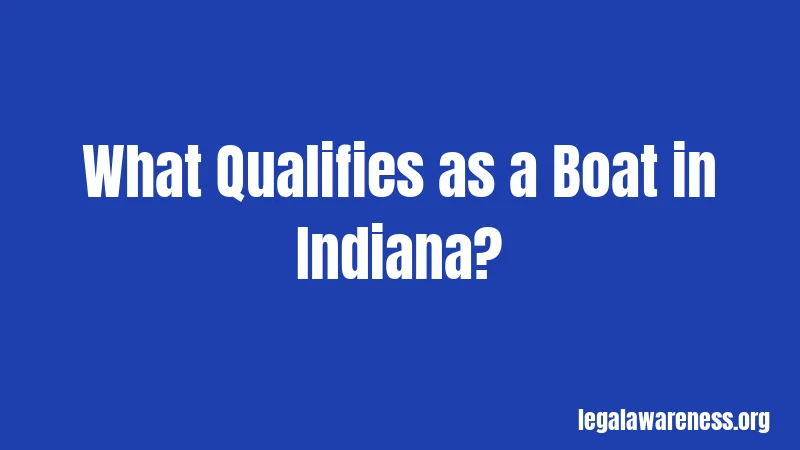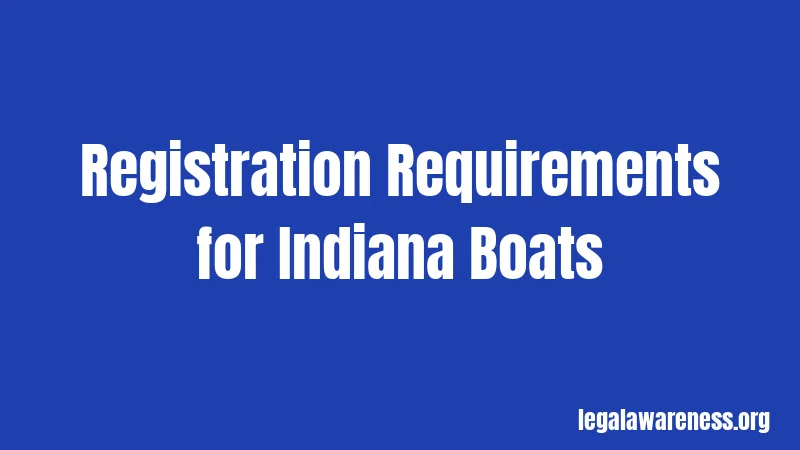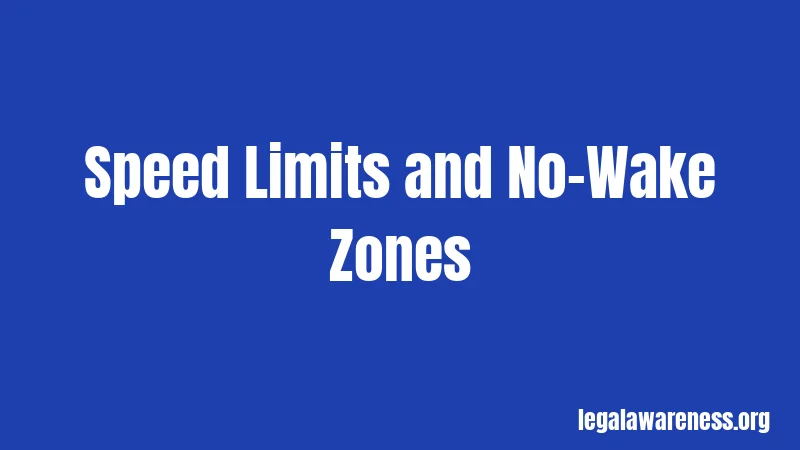Boat Laws in Indiana (2026): Rules Every Hoosier Boater Must Know
Most people think boating is all fun and sunshine. And yeah, it mostly is. But Indiana has some pretty strict rules about operating boats on its lakes and rivers. Break them, and you could lose more than just your boat. You could lose your driver’s license too.
Let me break down exactly what you need to know before you hit the water in Indiana.
What Qualifies as a Boat in Indiana?

Indiana boat laws apply to any motorized vessel. That includes fishing boats, pontoons, jet skis (which Indiana calls PWCs), and even sailboats with motors. Basically, if it’s got an engine and it’s on the water, these laws cover it.
Non-motorized boats like kayaks and canoes? They have fewer rules. But they still need to follow safety requirements.
Who Can Legally Operate a Boat in Indiana?
You have to be at least 15 years old to operate a motorboat over 10 horsepower. No exceptions. Kids under 15 can’t drive these boats at all, even with an adult on board.
Okay, so you’re 15 or older. Now what?
If you have a valid Indiana driver’s license, you’re good to go. Just hop in and drive. But if you’re 15 and don’t have your driver’s license yet, you need to complete a boater education course approved by the Indiana Department of Natural Resources. You’ll also need an ID card from the Indiana BMV.
Never had a driver’s license and don’t plan to get one? Same deal. Take the boater education course and get your BMV ID. Keep it on the boat whenever you’re operating it. Conservation officers can ask to see it anytime.
Stay with me here. These rules apply to everyone operating motorboats on Indiana’s public waters.
Registration Requirements for Indiana Boats

Every motorized boat in Indiana needs to be registered with the Bureau of Motor Vehicles. Yep, the same place you register your car.
When you register your boat, you’ll get a registration number and two decals. The registration number goes on both sides of the bow in block letters at least three inches high. The letters need to contrast with your boat’s color so they’re easy to read. The decals go right after the numbers, in line with them.
Here’s an example of what’s correct: IN 1234 YZ
What’s wrong: IN1234YZ (no spaces)
The spaces matter. Conservation officers look for this stuff.
Registration Fees
Registration isn’t free. The fee depends on your boat’s length and value. For a new registration, you’ll pay:
- Length fee: $10 to $25 based on boat size
- Excise class fee: Varies by boat value
- Lake and River Enhancement fee
Annual renewal fees are simpler. They’re based just on your boat’s excise class and range from $10 to $25.
You also pay annual excise tax based on your boat’s original value. This is separate from registration.
What Boats Don’t Need Registration?
Some boats get a pass:
- Canoes without motors
- Rowboats
- Paddleboats
- Out-of-state boats used in Indiana for 60 days or less
- Boats on Lake Michigan for 180 days or less
Non-motorized sailboats still need decals even though they’re not motorized. Weird rule, but it’s the law.
Required Safety Equipment
Let’s talk about what you need on board. This is super important.
Life Jackets
Every boat must have one Coast Guard-approved life jacket for each person on board. The life jackets must be the right size and in good condition. Not falling apart or torn up.
If your boat is 16 feet or longer (except canoes and kayaks), you also need one throwable flotation device. That’s usually a ring buoy or cushion.
Kids Under 13
Here’s a big one. Children under 13 must wear a life jacket at all times when the boat is moving. Not just have one nearby. Actually wear it. The only exceptions are if the boat is docked or the kid is inside an enclosed cabin.
Pretty much every parent misses this one. Don’t be that person who gets a ticket because your kid took off their life jacket.
PWC Rules
Anyone on a personal watercraft (jet ski) must wear a life jacket. Operators and passengers. All the time. No exceptions.
PWCs also need either a self-circling feature or a lanyard engine cutoff switch. If you have the lanyard, it must be attached to you while operating.
Fire Extinguishers
Most boats with enclosed engine compartments need a Coast Guard-approved fire extinguisher. Check your boat’s requirements based on size.
Sound Devices
You need some way to make sound that can be heard for at least one mile. A horn or whistle works. This is for signaling other boats in fog or emergencies.
Navigation Lights
Between sunset and sunrise, boats need proper navigation lights. The type depends on your boat size. Most recreational boats under 40 feet need:
- Red and green sidelights
- White stern light
- White all-around light (for smaller boats)
If your boat is anchored away from a dock overnight, you need a white anchor light visible from all directions.
Right? Pretty straightforward once you see it listed out.
Speed Limits and No-Wake Zones

Indiana has some specific speed rules that catch people off guard.
Nighttime Speed Limit
Between sunset and sunrise, boats can only go 10 mph maximum. Everywhere. On every Indiana lake and river. This is statewide.
Most people don’t realize this applies even on big lakes.
Shoreline Rules
Here’s where it gets tricky. On lakes at least 500 feet wide, you can’t go faster than idle speed within 200 feet of the shoreline. The only exceptions are when you’re trolling or heading to a dock.
On smaller tributaries and certain lakes, the distance might be different. Some require idle speed within 50 feet instead of 200 feet.
What’s Idle Speed?
Idle speed means the slowest speed your boat can go and still maintain steering. Basically, barely moving.
No-Wake Zones
Watch for posted no-wake signs. These are marked with buoys. In no-wake zones, you can’t create a wake behind your boat regardless of speed.
Violating no-wake zones near homes during high water can lead to serious penalties. The DNR takes this super seriously because wakes can flood houses.
Boating Under the Influence
Wondering if this applies to you? It does.
Operating a motorboat while intoxicated is illegal in Indiana. Period. Same 0.08% blood alcohol limit as driving a car.
First Offense Penalties
Get caught the first time and you’re looking at:
- Class C misdemeanor charge
- Up to 60 days in jail
- Fine up to $500
- Loss of driving privileges for 90 days to 2 years
Wait, it gets better. A BUI (Boating Under the Influence) in Indiana can suspend your regular driver’s license. Not just your boating privileges. Your actual car license.
Yep, that’s all it takes.
Repeat Offenses
Second offense within five years? Now we’re talking Class A misdemeanor or even a Level 6 felony. That’s up to one year in jail and $5,000 in fines.
Serious Injury or Death
If you cause serious injury while boating drunk, you face Class A misdemeanor or Level 6 felony charges. If someone dies, it’s a Level 5 felony with one to six years in prison and up to $10,000 in fines.
This one’s probably the most important rule. Just don’t do it.
Implied Consent Law
By operating a boat on Indiana waters, you automatically consent to drug and alcohol testing. If an officer asks you to take a breath test and you refuse, you can be arrested immediately.
Refusing the test doesn’t get you out of trouble. It makes things worse.
Accident Reporting Requirements
If you’re in a boating accident, you must report it if:
- Someone died
- Someone disappeared from the boat
- Someone needed medical treatment beyond first aid
- Property damage exceeded $2,000
Report accidents as quickly as possible to local law enforcement. You can get a Boat Accident Report form from the Indiana DNR.
Honestly, this is the part most people forget about. Don’t skip it.
Special Rules for Personal Watercraft
PWCs have extra rules beyond regular boats.
You can’t:
- Weave through congested boat traffic
- Follow behind water skiers
- Jump the wake of another boat
- Cut between a boat and someone being towed
These actions are specifically illegal for PWC operators. Do them and you’ll get ticketed.
Towing Water Skiers
Want to pull someone on skis, a tube, or wakeboard? You need:
- An observer 12 years or older watching the person being towed (in addition to the driver)
- Proper towing equipment
- The person being towed must wear a Coast Guard-approved life jacket
The observer can’t be the driver. You need two people minimum.
State Park and Reservoir Requirements
Planning to boat at a state park, state forest, or reservoir? You need a lake permit in addition to your boat registration.
You can buy permits at:
- State park offices
- Reservoir offices
- Indiana DNR locations
The cost varies by location. Check before you go.
Diver-Down Flags
If divers are in the water, they must display a diver-down flag. Boats must stay at least 150 feet away from these flags.
The flag is red with a white diagonal stripe. See one? Stay clear.
Environmental Protection Rules
Indiana takes water quality seriously.
Trash and Litter
You can’t throw anything into the water or onto the shore. Nothing. Not even a candy wrapper. Violations can result in fines.
Invasive Species
Remove all plants, mud, and debris from your boat and trailer before moving to a different lake. Zebra mussels spread between lakes on boats and trailers. They can survive up to a week out of water.
Drain your live wells, bait buckets, and bilge before leaving.
How to Register Your Boat
Ready to register? Here’s what you need to do.
Step 1: Gather Documents
You’ll need:
- Proof of ownership (title, bill of sale, or Manufacturer’s Statement of Origin)
- Valid photo ID
- Payment for fees
If you don’t have a title and your boat doesn’t require one, complete a Watercraft Ownership Affidavit (Form 55100).
Step 2: Visit the BMV
Go to any Indiana BMV branch. You can’t do the initial registration online.
Complete the Application for Certificate of Registration and Certificate of Title.
Step 3: Pay Fees
Pay your registration fee, excise tax, and Lake and River Enhancement fee.
Step 4: Wait for Your Decals
Your registration certificate and decals arrive in the mail within 21 business days. Don’t operate your boat until you get them.
Step 5: Display Your Numbers
Paint or permanently attach your registration number on both sides of the bow. Place your decals three inches after the numbers, in line with them.
Renewing Your Registration
Indiana boat registrations expire annually. Your renewal date is based on your last name. The BMV will mail you a renewal notice.
You can renew:
- Online through myBMV
- By mail
- In person at any BMV branch
Annual renewal is way easier than the initial registration.
What Happens If You Break These Laws?
Penalties vary based on the violation.
Minor violations like not displaying your registration number correctly might get you a warning or small fine. More serious violations lead to bigger consequences.
Some common penalties:
- Operating without registration: Fine and possible impoundment
- No life jackets: Fine up to $200
- Reckless operation: Misdemeanor charges
- BUI: Jail time, fines, license suspension
Conservation officers patrol Indiana waterways regularly. They will check your boat for compliance.
Where to Get Help
Indiana Department of Natural Resources
402 West Washington Street, Room W160A
Indianapolis, IN 46204
(877) 463-6367
Website: in.gov/dnr
Bureau of Motor Vehicles
For registration questions:
(888) 692-6841
Website: in.gov/bmv
Boater Education
Take an approved boating safety course online at boat-ed.com/indiana
The course is free and gives you everything you need to pass the test.
Frequently Asked Questions
Do I need a license to drive a boat in Indiana?
If you have a valid driver’s license, no separate boat license is required. If you’re 15 or older without a driver’s license, you need to complete a boater education course and carry a BMV-issued ID card.
Can passengers drink alcohol on a boat?
Yes, passengers can drink. But the operator must stay completely sober. If the operator has a BAC of 0.08% or higher, that’s illegal.
What happens if I don’t register my boat?
Operating an unregistered boat is illegal. You’ll face fines and your boat could be impounded. Register it before you use it.
Do kayaks and canoes need registration?
No. Non-motorized kayaks and canoes are exempt from registration in Indiana. They still need to follow safety equipment rules though.
How much does boat registration cost?
It depends on your boat’s size and value. Initial registration ranges from $35 to over $100. Annual renewal is typically $10 to $25 based on excise class.
Final Thoughts
Now you know the basics of Indiana boat laws. The rules aren’t that complicated once you break them down. Register your boat, wear your life jackets, don’t drink and drive, and watch your speed.
Most violations are completely avoidable. Just pay attention to the requirements and you’ll be fine.
Stay safe on Indiana’s beautiful lakes and rivers. And when in doubt, check with the DNR or take a boating safety course.
References
- Indiana Code Title 14, Article 15 – Watercraft Laws – https://www.in.gov/dnr/
- Indiana Bureau of Motor Vehicles – Watercraft Registration – https://www.in.gov/bmv/registration-plates/boat-registration/
- Indiana Department of Natural Resources – Boating Safety – https://www.in.gov/dnr/law-enforcement/education/boating-education-and-safety/
- Handbook of Indiana Boating Laws and Responsibilities (2024 Edition) – https://www.boat-ed.com/indiana/handbook
- Indiana Administrative Code 312 IAC 5 – Boating Regulations – https://iar.iga.in.gov/code/2026/312/5
